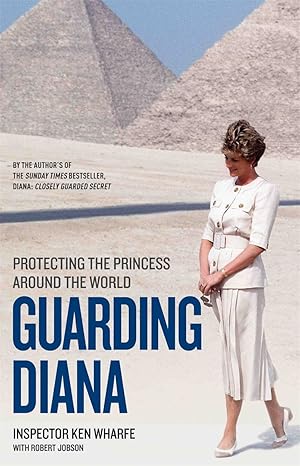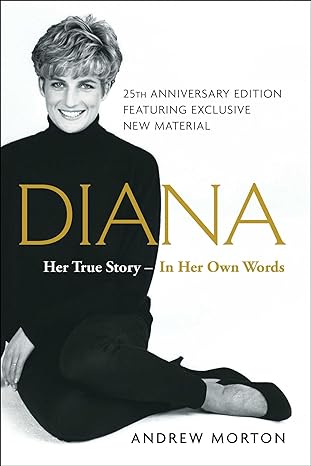Diana: Remembering the Princess
“Today, twenty-five years since Diana's death, seems the right moment for a reassessment of this remarkable woman. Did the Royal Family learn lessons from her life, about protection and privacy, about how to incorporate 'outsiders' into their ranks, about how to manage scandal? Did it take any lessons from her death, and the public's reaction not only to that, but to the behaviour of, in particular, the Queen and Prince Charles, in the aftermath? Or have the family and the Palace - 'the men in grey suits', as Diana called them - continued on the same track, unchanged, repeating many of the mistakes made with her, from her first nervous ventures in royal circles to her later defiance of traditional protocols?These and many other questions are explored in this authoritative book, written by two people closely associated with Inspector Ken Wharfe was the Princess's police protection officer for six years during the most turbulent period of her marriage to Prince Charles. Ros Coward was chosen as author of the official book by the Diana, Princess of Wales Memorial Trust. Their book is both an examination of the people and events of the time, and an elegiac tribute to one of the most iconic figures of the late twentieth century.
A Look Back at a Princess
"Diana: Remembering the Princess" by Ken Wharfe and Ros Coward is a poignant tribute to Princess Diana, reflecting on her life and legacy twenty-five years after her tragic death. The book offers a unique perspective, combining Wharfe's firsthand account as Diana's personal bodyguard with Coward's insightful analysis of her public image and impact.
Through the Eyes of a Bodyguard:
Wharfe's close proximity to Diana allows him to offer intimate details about her personality, daily routines, and private struggles. He paints a compelling portrait of a complex and compassionate woman, highlighting her warmth, humor, and unwavering dedication to her charitable work. Through Wharfe's anecdotes, we witness Diana's genuine interactions with the public and her commitment to making a difference in the world.
Examining the Public Figure:
Coward, a renowned cultural historian, provides a scholarly analysis of Diana's public image and the media's portrayal of her. She examines the construction of Diana as a fairy-tale princess, the challenges she faced within the Royal Family, and the evolution of her public persona over time. Coward offers insightful commentary on the impact of Diana's celebrity, fashion choices, and humanitarian efforts, contributing to a well-rounded understanding of her historical significance.
A Balanced Perspective:
"Diana: Remembering the Princess" avoids hagiography, offering a balanced view of Diana's life and legacy. While Wharfe's personal connection leads to admiration and affection, Coward's analysis provides a critical lens that acknowledges both Diana's strengths and weaknesses. This balanced approach allows readers to form their own informed opinions about Diana, rather than simply being presented with a one-sided portrayal.
A Timeless Legacy:
The book reminds us of Diana's enduring influence and her continued relevance in the public imagination. Her advocacy for various causes, her willingness to challenge societal norms, and her genuine connection with people from all walks of life continue to inspire millions around the world. "Diana: Remembering the Princess" serves as a valuable reminder of her remarkable legacy and the positive impact she made on our world.
Recommendation:
"Diana: Remembering the Princess" is a thought-provoking and insightful read for anyone interested in Princess Diana's life and legacy. Wharfe's personal anecdotes and Coward's scholarly analysis offer a comprehensive and balanced perspective, making this book a valuable addition to the Diana literature. Whether you are a longtime admirer or simply seeking an introduction to this iconic figure, "Diana: Remembering the Princess" provides a worthwhile and engaging read.
Additional Points:
- Target audience: This book is likely to appeal to fans of Princess Diana, as well as readers interested in British history, royal biographies, and the media's portrayal of celebrities.
- Writing style: The writing is clear, concise, and engaging. Wharfe and Coward effectively blend personal anecdotes with historical analysis, creating a captivating read.
- Strengths: The book's strengths lie in its personal anecdotes, insightful analysis, balanced perspective, and exploration of Diana's enduring legacy.
- Weaknesses: Some readers may find the book to be overly sentimental or lacking in new insights.
- Overall impression: "Diana: Remembering the Princess" is a well-written and informative tribute to Princess Diana. It offers a unique and insightful perspective on her life and legacy, making it a valuable read for anyone interested in this iconic figure.
How can you read this book?
Click these simple buttons to read this book today.
You may like these books... Buy now!

|

|

|
Ken Wharfe, Author & Inspector ![]()
MVO: Royal Protection Officer and Author
Inspector Ken Wharfe, MVO, is renowned for his distinguished career as a Royal Protection Officer and author. Born on November 22, 1948, he served as the personal protection officer to the late Diana, Princess of Wales, overseeing round-the-clock security at home and abroad from 1987 to 1993.
Wharfe began his journey in law enforcement by joining the Metropolitan Police Force as a special cadet at the age of 17. Rising through the ranks, he achieved the rank of Inspector before being selected to join Scotland Yard's elite Royal and Diplomatic Department, SO14. Notably, he underwent training with the Special Air Service (SAS) before being entrusted with the critical role of heading up security for the heir apparent, Prince William, and Prince Harry in 1986. The young princes affectionately referred to him as 'Uncle Ken.'
In 1987, Wharfe's career took a pivotal turn when he was appointed as the personal protection officer to the Princess of Wales. His close association with Diana and her children lasted until his retirement from the Metropolitan Police in 2002, after 35 years of dedicated service, nearly half of which was in royalty protection.
Recognizing his unwavering loyalty and service, The Queen bestowed upon Ken Wharfe the honor of being appointed a Member of the Royal Victorian Order (MVO) in 2002. This distinction is a personal gift from the Sovereign.
Following the tragic death of Princess Diana, Wharfe continued his commitment to royal protection, serving as the Personal Protection Officer for the Queen's cousin, the Duke of Kent, until his retirement.
Ken Wharfe co-authored the memoir "Diana: Closely Guarded Secret" with Robert Jobson. The book, providing insights into his service with the late Princess, became a bestseller upon its initial publication and again in a revised edition in 2016.
Post-retirement, Ken Wharfe remains a sought-after figure, sharing his experiences and expertise as a speaker and commentator on royal security. His unique perspective, credibility, and independence on the subject make him a valuable contributor to discussions and analyses of security issues.
In addition to his literary contributions, Wharfe has carved a niche as a freelance security consultant, regularly providing insights on security matters through media outlets such as the BBC, ITN, NBC, and CBS. His multifaceted career stands as a testament to his dedication to public service and the protection of the British royal family.


